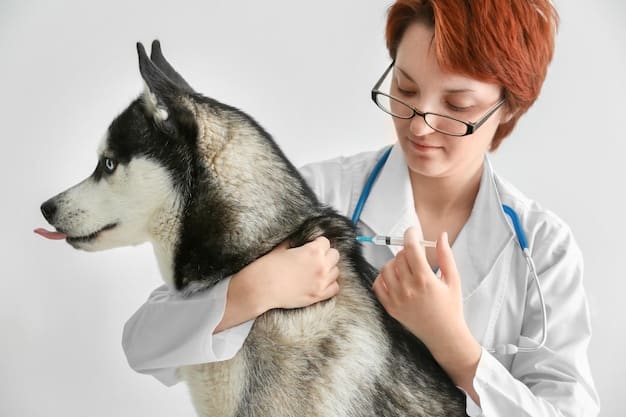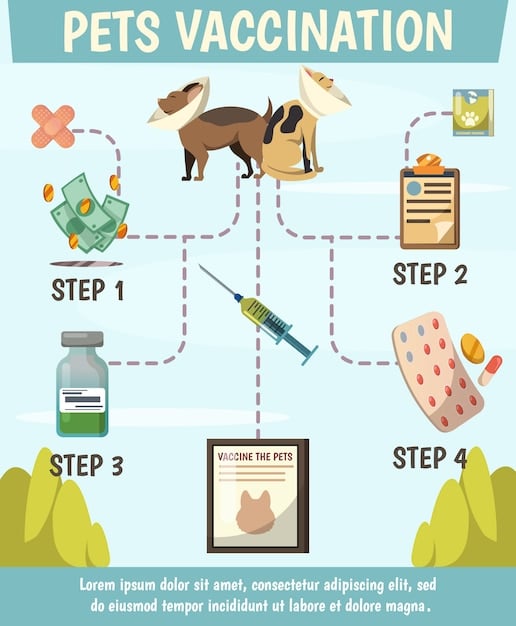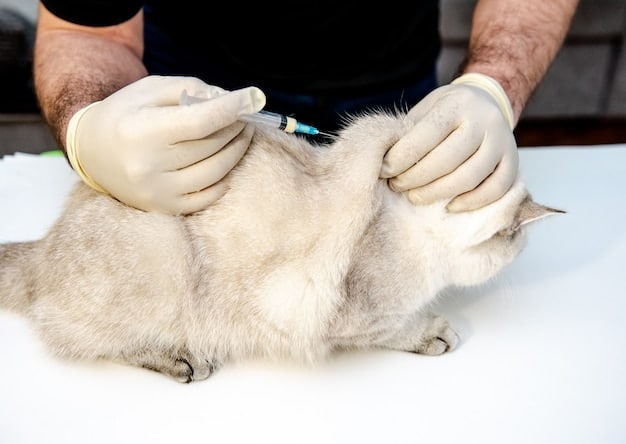Understanding Pet Vaccinations: Protect Your Pet’s Health in 2025

Understanding Pet Vaccinations: A Comprehensive Guide to Protecting Your Pet’s Health in 2025 is crucial for responsible pet ownership, offering a roadmap for safeguarding your furry friend against preventable diseases through timely and appropriate vaccinations.
Navigating the world of pet healthcare can feel overwhelming, especially when it comes to preventative measures like vaccinations. This article, **Understanding Pet Vaccinations: A Comprehensive Guide to Protecting Your Pet’s Health in 2025**, provides a clear and concise overview of everything you need to know to keep your beloved companion safe and healthy.
Why Pet Vaccinations are Essential
Vaccinations are a cornerstone of preventative pet healthcare. They protect your pets from a range of serious and potentially fatal diseases. Understanding why vaccinations are necessary can help you make informed decisions about your pet’s health.
Vaccines work by exposing your pet to a weakened or inactive form of a disease-causing agent, known as an antigen. This stimulates their immune system to produce antibodies, which are specialized proteins that recognize and neutralize the antigen. If your pet is later exposed to the real disease, their immune system will be primed and ready to fight it off.
Core vs. Non-Core Vaccines
Not all vaccines are created equal. Some are considered core vaccines, meaning they are recommended for all pets of a particular species, regardless of their lifestyle. Others are non-core vaccines, which are recommended based on individual risk factors.
- Core vaccines: These protect against common and serious diseases that pose a significant threat to most pets. Examples include rabies, distemper, parvovirus, and adenovirus in dogs, and rabies, feline viral rhinotracheitis, calicivirus, and panleukopenia in cats.
- Non-core vaccines: These are recommended for pets at higher risk of exposure to specific diseases. Factors like geographic location, lifestyle, and exposure to other animals can influence the need for these vaccines. Examples include Lyme disease, Bordetella (kennel cough), and canine influenza in dogs, and feline leukemia virus (FeLV) and feline immunodeficiency virus (FIV) in cats.

Ultimately, vaccines are a proactive way for you to maintain the health of your pet. By consulting with your veterinarian and adhering to vaccination schedules, you’re actively contributing to a longer and healthier life for your furry friend.
Understanding the Canine Vaccination Schedule
A well-structured vaccination schedule is crucial for puppies, as their immune systems are still developing and vulnerable to infections. This schedule ensures they receive the necessary protection during their formative months.
Puppies typically receive their first vaccinations at around 6-8 weeks of age. These initial shots help to stimulate their immune system and provide a foundation of protection. Booster shots are then administered at regular intervals to strengthen their immunity.
Key Vaccines for Puppies
The core vaccines for puppies typically include protection against canine distemper, adenovirus, parvovirus, and parainfluenza (often combined into a single shot known as DHPP). Rabies vaccination is also a core vaccine, but it is usually administered at a later age, typically around 12-16 weeks.
- 6-8 weeks: DHPP (Distemper, Adenovirus, Parvovirus, Parainfluenza)
- 10-12 weeks: DHPP booster
- 14-16 weeks: DHPP booster, Rabies
- 1 year: DHPP booster, Rabies booster
Beyond the core vaccines, your veterinarian may recommend additional non-core vaccines based on your puppy’s lifestyle and risk factors. It’s also important to note that this is only a guide and your pets vaccine schedule will vary.
Understanding the Feline Vaccination Schedule
Similar to puppies, kittens require a specific vaccination schedule to protect them from common and serious feline diseases. This schedule is designed to provide optimal immunity during their vulnerable early stages of life.
Kittens typically receive their first vaccinations at around 6-8 weeks of age. These initial shots help to stimulate their immune system and provide a foundation of protection. Booster shots are then administered at regular intervals to strengthen their immunity. These vaccines can greatly improve your cats life by preventing certain diseases.
Key Vaccines for Kittens
The core vaccines for kittens typically include protection against feline viral rhinotracheitis, calicivirus, and panleukopenia (often combined into a single shot known as FVRCP). Rabies vaccination is also a core vaccine, but it is usually administered at a later age, typically around 12-16 weeks.
- 6-8 weeks: FVRCP (Feline Viral Rhinotracheitis, Calicivirus, Panleukopenia)
- 10-12 weeks: FVRCP booster, FeLV (if recommended)
- 14-16 weeks: FVRCP booster, Rabies, FeLV booster (if recommended)
It’s crucial to consult with your veterinarian to determine the most appropriate vaccination schedule for your kitten, as individual needs may vary.

The Importance of Booster Shots
While the initial series of vaccinations is crucial, booster shots are equally important for maintaining long-term immunity. Booster shots are administered periodically throughout your pet’s life to reinforce their immune system’s ability to fight off diseases.
The frequency of booster shots can vary depending on the vaccine type, your pet’s age, and their overall health status. Some vaccines, such as rabies, may require boosters every 1-3 years, while others may offer longer-lasting protection.
Factors Influencing Booster Schedules
Several factors can influence the recommended booster shot schedule for your pet. These include:
- Type of vaccine: Different vaccines offer varying durations of immunity.
- Age of pet: Younger and older pets may require more frequent boosters.
- Lifestyle: Pets with high exposure risks may need more frequent boosters.
- Health status: Pets with underlying health conditions may have altered vaccine responses.
By adhering to recommended booster shot schedules, you can ensure that your pet maintains optimal protection against preventable diseases throughout their life.
Addressing Common Concerns About Pet Vaccinations
Many owners have hesitations about getting their pets vaccinated. Therefore, addressing these concerns is crucial. It’s natural to have questions and concerns about any medical procedure, including pet vaccinations. By understanding the facts and addressing common misconceptions, you can make informed decisions about your pet’s health.
One common concern is the potential for adverse reactions. While adverse reactions are possible, they are generally rare and mild. Most pets experience no side effects at all, and those that do usually experience only mild symptoms like fever.
Weighing the Risks and Benefits
Before vaccinating your pet, it’s essential to weigh the potential risks against the benefits. In most cases, the benefits of vaccination far outweigh the risks, as vaccinations can prevent serious and potentially fatal diseases.
You can consult with your veterinarian regarding side effects of vaccines. This discussion and other methods can lead you to a place of safety
- Discuss any concerns with your veterinarian: They can address your specific questions and concerns.
- Monitor your pet closely after vaccination: Watch for any signs of an adverse reaction.
- Report any adverse reactions to your veterinarian: This helps them track vaccine safety and identify potential issues.
Overall, it’s better to get your pet the necessary vaccinations. Though, you should always consult with your veterinarian if you have questions.
Looking Ahead: Pet Vaccinations in 2025
The landscape of pet vaccinations is constantly evolving, with ongoing research and development leading to newer and more effective vaccines. As we approach 2025, several advancements are on the horizon that could revolutionize how we protect our pets from disease.
One trend is the development of more targeted and personalized vaccines. These vaccines are designed to stimulate a stronger immune response with fewer side effects, tailored to the individual needs of each pet.
Advancements on the Horizon
The future of pet vaccinations holds exciting possibilities, including:
- Combination vaccines: These vaccines protect against multiple diseases in a single shot, reducing the number of injections your pet needs.
- Longer-lasting vaccines: These vaccines offer extended protection, reducing the frequency of booster shots.
- Oral vaccines: These vaccines are administered orally, making the vaccination process easier and less stressful for pets.
Make sure that you do your research and get the facts directly from veterinary professionals. This will put you on the right path to creating a well informed conclusion.
| Key Point | Brief Description |
|---|---|
| 🛡️ Core Vaccines | Essential for all pets; protect against common, serious diseases. |
| 💉 Booster Shots | Maintain long-term immunity; frequency varies by vaccine and pet. |
| 🗓️ Vaccination Schedule | Puppies and kittens require initial series and boosters for protection. |
| 💡 Future Trends | Personalized, combination, longer-lasting, and oral vaccines. |
Everything You Need to Know
▼
Core vaccines for dogs include rabies, distemper, adenovirus, parvovirus, and parainfluenza. These protect against common and serious diseases. They are often administered in combination shots.
▼
Core vaccines for cats include rabies, feline viral rhinotracheitis, calicivirus, and panleukopenia. These are essential to protect against prevalent feline diseases.
▼
Booster shot frequency depends on the vaccine, age, lifestyle, and health. Some, like rabies, might be every 1-3 years. Consult your vet for a customized schedule.
▼
Adverse reactions are rare and mild. Weigh the low risks against the significant benefits of preventing serious, potentially fatal diseases. Report any reactions to your vet.
▼
Future pet vaccines include combination shots, longer-lasting formulas, oral administration, and more personalized options tailored to individual needs for better efficacy and fewer side effects.
Conclusion
Protecting your pet’s health through vaccinations is a vital part of responsible pet ownership. By understanding the importance of core and non-core vaccinations, following appropriate vaccination schedules, and staying informed about future advancements, you can ensure your furry friend lives a long, healthy, and happy life.





